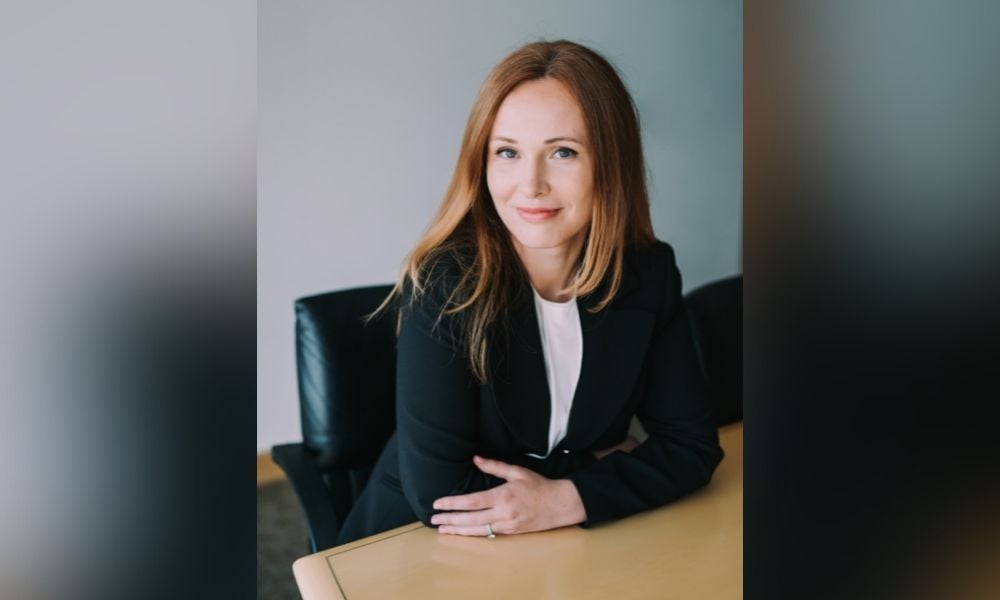
The constant struggle of parenting, work, and sleeping hours creates tension, Malazhavaya says

With fewer expectations that law firms must be in a high-rise downtown with expensive wall art, a fancy reception counter, and costly flowers on the coffee table, tax lawyer and founder of Advotax law, Anna Malazhavaya, say she is determined to keep her autonomy with her private practice and encourages young mothers not to quit the legal profession because of the lack of support.
Now that almost everyone works from home, Malazhavaya says, clients don’t care about fancy law offices anymore. If you’re a true professional, people are willing to recognize the value of your business from anywhere.
Advotax Law helps businesses organize their affairs tax-efficiently, provides advice on tax implications, assists people experiencing problems with the CRA, and often handles tax bills of millions usually issued incorrectly because of a mistake. Malazhavaya says her role is to save financial lives and prove clients’ innocence when accused by the CRA of wrongdoing.
Many people get in trouble with the CRA because they have a language barrier or get defrauded, and a prevalent mistake people also make with the CRA is not hiring the right professionals to prepare their tax returns, she says.
She recently defended a Russian refugee who invested in starting a business with his $300,000 cash inheritance but failed. When the CRA looked at this variation, she says they saw that he made very little money but had lots of cash deposits in his bank accounts. The CRA suspected he was probably making cash income on the side and didn’t report his income, so “we had to fight about it and prove that the money came from Russia to Canada in cash and suitcases.
“What we’re doing is we’re trying to fix that mistake, save that person’s financial life, their house, pension service, savings for their kid’s education. I think it is imperative and I am convinced that there are tax aspects in everything we do in our life.”
Since migrating to Canada with her husband in 2004, starting Osgoode law school four months later and obtaining her degree notwithstanding the language barrier she faced, Malazhavaya has built her legal career in tax law and says she is designing a life of freedom for herself.
“My oral communication was non-existent to the point that in my first year of August classes, I did not feel comfortable talking to my classmates because I didn’t think I could carry on the conversation.” However, “it’s easy to pick up another language when you’re young,” she says.
Her English significantly improved after landing a summer job in Cassels Brock and Blackwell LLP in her second year of law school because the firm had the resources to develop her writing and speaking skills. She worked as an associate with Cassels Brock for six years, but with two babies under the age of two, her entire family back in Belarus and her husband’s consulting job that required much travel, Malazhavaya says she struggled to juggle her career because she did not have much help. However, she says these problems are not exclusive to her because “any immigrant or any mother goes through them.”
The struggle of parenting, work, and sleeping hours creates tension, and people have different standards on the kind of parent and type of lawyer they want to be, she says. Sometimes, it can feel like there are not enough hours to combine the two, so while some people are okay with reducing the parent hours, some are satisfied with lowering the work hours.
For example, in a firm with an economic model that requires long hours, tucking kids at night, reading a story or cooking dinner might be challenging, however, “there are firms with financial models that allow for that drop in productivity when you must leave and stay home with a sick child, so it’s individual.” she says.
She says lawyers who are young mothers should not leave the profession because of the lack of support because the crunch years of children are minimal compared to the longevity of their careers.
“When you think that everything’s falling apart, and you’re a horrible mother and horrible lawyer, keep going. If you’re going through hell, keep going. Your babies will not be babies forever.”
She says she was lucky Cassels Brock recognized the longevity of her career and understood her time as a young mother would eventually end because the law is a business, and firms have different financial models.
Malazhavaya says her desire for freedom inspired her to start her private practice.
Starting a law practice was challenging and a learning experience because the high-risk tolerance and pandemic made things harder, but she says her resilience as an immigrant helped.
She took a risk hiring her first employee after losing her first office space to work through the pandemic. By June of 2020, her practice hired an articling student to ease the legal demands of clients and will soon include a senior lawyer, she says.
“I knew that no matter how bad things go, I would still be in a better position than I was years ago with a little backpack, $300 in my pocket and no English. It will still be easier, and so I was not scared to fail,” she says.
Before migrating to Canada, Malazhavaya moved to the United States from Belarus in 2000 in an international exchange program for students from former Soviet Union countries and worked as a waitress to pay for her ESL courses, LSAT and first-year law school tuition.